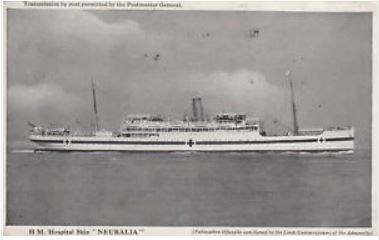Difference between revisions of "HMHS Neuralia"
From Our Contribution
(Created page with "{{Infobox | name = HMHS Neuralia | title = HMHS Neuralia | above = | subheader = | image = File:HMHS_Neuralia.jpg | caption...") |
|||
| Line 5: | Line 5: | ||
| subheader = | | subheader = | ||
| − | | image = [[File:HMHS_Neuralia.jpg]] | + | | image = [[File:HMHS_Neuralia.jpg|border|500px]] |
| caption = | | caption = | ||
| image2 = | | image2 = | ||
Revision as of 18:31, 19 July 2018
 | |
| History | |
|---|---|
| Name | HMHS Neuralia |
| Builder/Built | 1912 Barclay Curle & Company, Glasgow |
| Type | Passenger / Cargo vessel |
| Displacement | 9,082 tons |
Remarks
Capacity: Passengers: 128 First Class, 98 Second Class. Launched 12th September 1912, completed 18th November 1912. The largest ship in the British India Fleet at this time.
Sister ship to Nevasa, the pair were most imposing looking ships and were built for the London - Calcutta Service. She saw action in the Mediterranean in 1915, most notably at Suvla Bay and Salonika as a hospital ship, she then saw service in the Indian Ocean. She returned to the UK in March of 1916 and remained on station with the Home Fleet until September 1918 when she was converted to an ambulance transport and remained as such until July 1919.
Hospital Ship or Ambulance Transport Service during WW1 carrying a medical team of 11 Officers; 15 Nurses, Other personnel 60. She could accommodate 27 Officers, 245 in cots, and 358 in berths. Neuralia served as a Hospital Ship or Ambulance Transport from 12 Jun 1915 until 31 Jul 1919.
Sunk during WW2 on 1 May 1945.